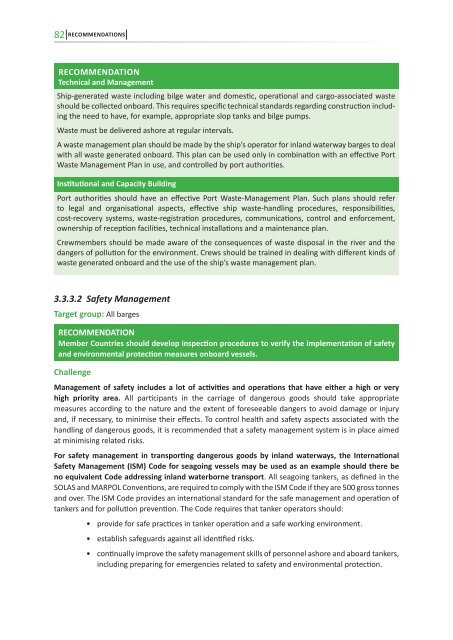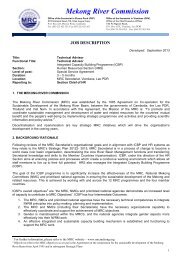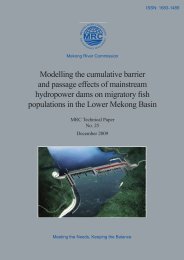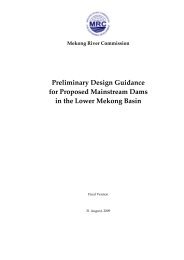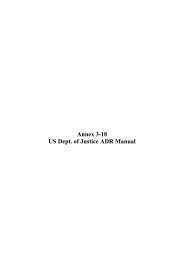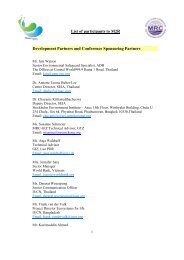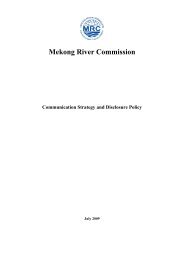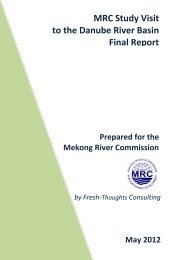Carriage, Handling and Storage of Dangerous Goods along
Carriage, Handling and Storage of Dangerous Goods along
Carriage, Handling and Storage of Dangerous Goods along
Create successful ePaper yourself
Turn your PDF publications into a flip-book with our unique Google optimized e-Paper software.
82 RECOMMENDATIONS<br />
RECOMMENDATION<br />
Technical <strong>and</strong> Management<br />
Ship-generated waste including bilge water <strong>and</strong> domestic, operational <strong>and</strong> cargo-associated waste<br />
should be collected onboard. This requires specific technical st<strong>and</strong>ards regarding construction including<br />
the need to have, for example, appropriate slop tanks <strong>and</strong> bilge pumps.<br />
Waste must be delivered ashore at regular intervals.<br />
A waste management plan should be made by the ship’s operator for inl<strong>and</strong> waterway barges to deal<br />
with all waste generated onboard. This plan can be used only in combination with an effective Port<br />
Waste Management Plan in use, <strong>and</strong> controlled by port authorities.<br />
Institutional <strong>and</strong> Capacity Building<br />
Port authorities should have an effective Port Waste-Management Plan. Such plans should refer<br />
to legal <strong>and</strong> organisational aspects, effective ship waste-h<strong>and</strong>ling procedures, responsibilities,<br />
cost-recovery systems, waste-registration procedures, communications, control <strong>and</strong> enforcement,<br />
ownership <strong>of</strong> reception facilities, technical installations <strong>and</strong> a maintenance plan.<br />
Crewmembers should be made aware <strong>of</strong> the consequences <strong>of</strong> waste disposal in the river <strong>and</strong> the<br />
dangers <strong>of</strong> pollution for the environment. Crews should be trained in dealing with different kinds <strong>of</strong><br />
waste generated onboard <strong>and</strong> the use <strong>of</strong> the ship’s waste management plan.<br />
3.3.3.2 Safety Management<br />
Target group: All barges<br />
RECOMMENDATION<br />
Member Countries should develop inspection procedures to verify the implementation <strong>of</strong> safety<br />
<strong>and</strong> environmental protection measures onboard vessels.<br />
Challenge<br />
Management <strong>of</strong> safety includes a lot <strong>of</strong> activities <strong>and</strong> operations that have either a high or very<br />
high priority area. All participants in the carriage <strong>of</strong> dangerous goods should take appropriate<br />
measures according to the nature <strong>and</strong> the extent <strong>of</strong> foreseeable dangers to avoid damage or injury<br />
<strong>and</strong>, if necessary, to minimise their effects. To control health <strong>and</strong> safety aspects associated with the<br />
h<strong>and</strong>ling <strong>of</strong> dangerous goods, it is recommended that a safety management system is in place aimed<br />
at minimising related risks.<br />
For safety management in transporting dangerous goods by inl<strong>and</strong> waterways, the International<br />
Safety Management (ISM) Code for seagoing vessels may be used as an example should there be<br />
no equivalent Code addressing inl<strong>and</strong> waterborne transport. All seagoing tankers, as defined in the<br />
SOLAS <strong>and</strong> MARPOL Conventions, are required to comply with the ISM Code if they are 500 gross tonnes<br />
<strong>and</strong> over. The ISM Code provides an international st<strong>and</strong>ard for the safe management <strong>and</strong> operation <strong>of</strong><br />
tankers <strong>and</strong> for pollution prevention. The Code requires that tanker operators should:<br />
• provide for safe practices in tanker operation <strong>and</strong> a safe working environment.<br />
• establish safeguards against all identified risks.<br />
• continually improve the safety management skills <strong>of</strong> personnel ashore <strong>and</strong> aboard tankers,<br />
including preparing for emergencies related to safety <strong>and</strong> environmental protection.


